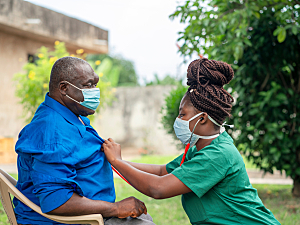Some research into COVID-19, such as this paper in PLoS One, notes the pandemic can be understood as a traumatic event and that some individuals have posttraumatic stress disorder–like responses.
Researchers have long recognized, though, that some individuals experience positive psychological changes in the face of adversity. This “posttraumatic growth” can manifest in a variety of ways, such as an increased appreciation for life, more meaningful interpersonal relationships, and a heightened sense of personal strength and spirituality.
Brea Willey, a visiting medical student in the Department of Neurology at Massachusetts General Hospital, Patrizia Vannini, PhD, a cognitive neuroscientist in the Department of Neurology at Brigham and Women’s Hospital, and colleagues conducted the first study of posttraumatic growth and other mental health factors related to COVID-19 among older adults. In EClinicalMedicine they describe how the pandemic affected Black and white older adults differently and name ways to foster posttraumatic growth.
Methods
The researchers distributed an online survey to older adults already participating in two long-term studies: the Harvard Aging Brain Study (245 individuals enrolled at the time of the survey) and the Instrumental Activities of Daily Living Study (45 individuals enrolled). The survey ran from March 23 to May 13, 2021, so it was launched more than one year after the beginning of the pandemic and after vaccine rollouts began.
The researchers analyzed data on only the 176 respondents who were Black (n=16) or non-Hispanic white (n=160). There were 102 women and 74 men, average age of 76. The Black and white groups did not differ significantly in age, years of education or socioeconomic status.
Results
The survey consisted of several standardized questionnaires:
Perceived Stress Scale—The average score for the full cohort was 14.9, indicating low to moderate stress; there was no significant difference by race.
Brief COPE Inventory—Of the 14 coping strategies measured, the one most endorsed across the entire cohort was acceptance. However, white respondents endorsed acceptance significantly more often than Black respondents (P=0.04). Religion was the strategy most endorsed by Black individuals, and the difference by race was statistically significant (P<0.001). There was also a significant difference between races in the use of emotional support, which was more commonly endorsed by white respondents (P=0.03).
Mental Health Scale of the Patient-Reported Outcomes Measurement Information System (PROMIS)—The average score across the entire cohort was 51.2, slightly above the U.S. population average, with no significant difference between races.
Posttraumatic Growth Inventory—The average total score for the whole cohort was 47.95. Black participants had a significantly higher average score (69.75 vs. 45.77 for white participants; P=0.003). Black individuals also reported significantly higher scores across each of the five subcategories of posttraumatic growth that were measured: Relating to Others, New Possibilities, Personal Strength, Spiritual Change, and Appreciation of Life.
In a regression analysis, race was the only demographic factor that significantly predicted posttraumatic growth. When perceived stress and coping strategies were added, race remained significant and the coping strategies of positive reframing and religion became newly significant.
Implications for Clinicians and Researchers
Previous studies have similarly identified positive reframing and religion as important factors in posttraumatic growth. Praying, meditating, and trying to view things in a different and positive manner may help individuals cultivate posttraumatic growth.
Some earlier research suggests increased posttraumatic growth could be due to the greater adversity faced by systematically oppressed groups. That idea is related to historical trauma, defined as mass group-experienced trauma over a life span and across generations. Historical trauma has been associated with present-day mental and physical health, and the current study can inform future research along those lines as it relates to race.
It’s notable that the elderly Black participants in this study were able to experience greater posttraumatic growth than white participants and similar mental health status despite their social inequities, higher risk of poor outcomes from COVID-19, and vulnerability to discrimination and racism. However, their resilience should not overshadow the importance of investing in an equitable allocation of mental health resources.
